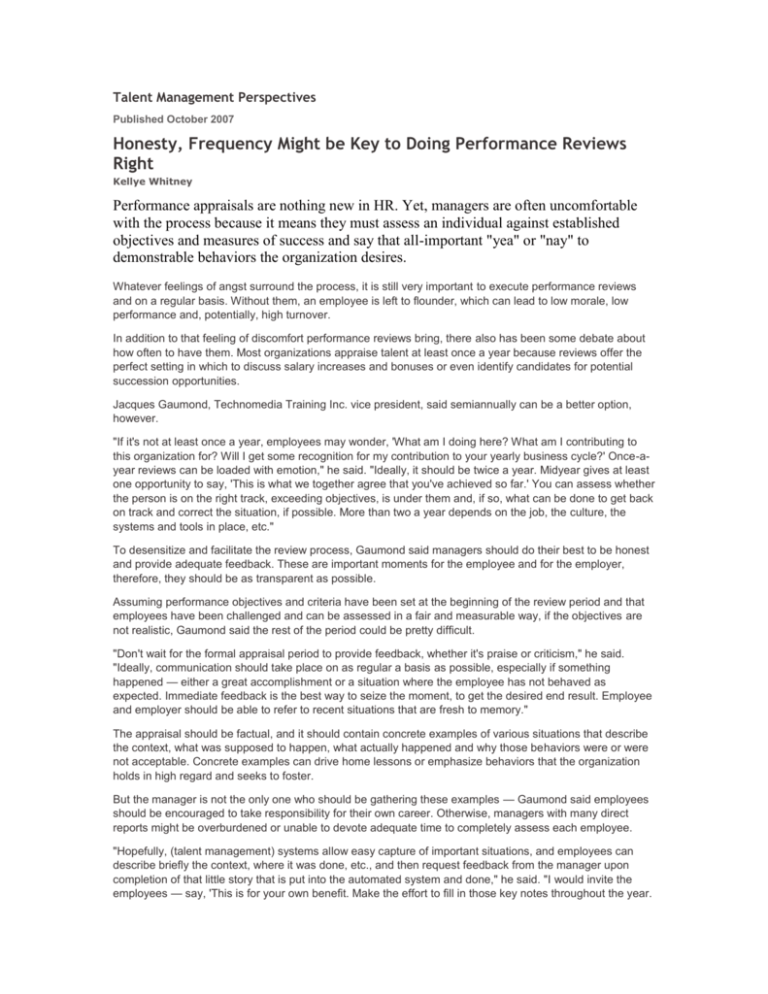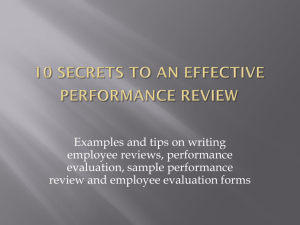Talent Management Perspectives
advertisement

Talent Management Perspectives Published October 2007 Honesty, Frequency Might be Key to Doing Performance Reviews Right Kellye Whitney Performance appraisals are nothing new in HR. Yet, managers are often uncomfortable with the process because it means they must assess an individual against established objectives and measures of success and say that all-important "yea" or "nay" to demonstrable behaviors the organization desires. Whatever feelings of angst surround the process, it is still very important to execute performance reviews and on a regular basis. Without them, an employee is left to flounder, which can lead to low morale, low performance and, potentially, high turnover. In addition to that feeling of discomfort performance reviews bring, there also has been some debate about how often to have them. Most organizations appraise talent at least once a year because reviews offer the perfect setting in which to discuss salary increases and bonuses or even identify candidates for potential succession opportunities. Jacques Gaumond, Technomedia Training Inc. vice president, said semiannually can be a better option, however. "If it's not at least once a year, employees may wonder, 'What am I doing here? What am I contributing to this organization for? Will I get some recognition for my contribution to your yearly business cycle?' Once-ayear reviews can be loaded with emotion," he said. "Ideally, it should be twice a year. Midyear gives at least one opportunity to say, 'This is what we together agree that you've achieved so far.' You can assess whether the person is on the right track, exceeding objectives, is under them and, if so, what can be done to get back on track and correct the situation, if possible. More than two a year depends on the job, the culture, the systems and tools in place, etc." To desensitize and facilitate the review process, Gaumond said managers should do their best to be honest and provide adequate feedback. These are important moments for the employee and for the employer, therefore, they should be as transparent as possible. Assuming performance objectives and criteria have been set at the beginning of the review period and that employees have been challenged and can be assessed in a fair and measurable way, if the objectives are not realistic, Gaumond said the rest of the period could be pretty difficult. "Don't wait for the formal appraisal period to provide feedback, whether it's praise or criticism," he said. "Ideally, communication should take place on as regular a basis as possible, especially if something happened — either a great accomplishment or a situation where the employee has not behaved as expected. Immediate feedback is the best way to seize the moment, to get the desired end result. Employee and employer should be able to refer to recent situations that are fresh to memory." The appraisal should be factual, and it should contain concrete examples of various situations that describe the context, what was supposed to happen, what actually happened and why those behaviors were or were not acceptable. Concrete examples can drive home lessons or emphasize behaviors that the organization holds in high regard and seeks to foster. But the manager is not the only one who should be gathering these examples — Gaumond said employees should be encouraged to take responsibility for their own career. Otherwise, managers with many direct reports might be overburdened or unable to devote adequate time to completely assess each employee. "Hopefully, (talent management) systems allow easy capture of important situations, and employees can describe briefly the context, where it was done, etc., and then request feedback from the manager upon completion of that little story that is put into the automated system and done," he said. "I would invite the employees — say, 'This is for your own benefit. Make the effort to fill in those key notes throughout the year. Come back to me, and we'll arrive at some consensus.' At the end of the discussion, it's their career, their performance and, hopefully, their rewards." It's also important to offer training to affect performance or correct some weakness discussed during the review process. A manager might want to highlight internal development opportunities, such as coaching, that go beyond standard training offerings. Providing a variety of development options makes it easier to accommodate employees' needs, requirements and work preferences. "Performance appraisals are obviously important to assess 'the what' and 'the how' that was achieved," Gaumond said. "That's what employees expect. That's what employee managers should take advantage of, but inquire beyond accomplishments. Ask, 'Where are you, from your own perspective, in your career? What are your career aspirations? What are your mobility desires? What do you feel you require in terms of development?' Seize those critical moments to not just end up with marks on the page but to end up with some sort of powerful conversation." Kellye Whitney is managing editor for Talent Management magazine.

